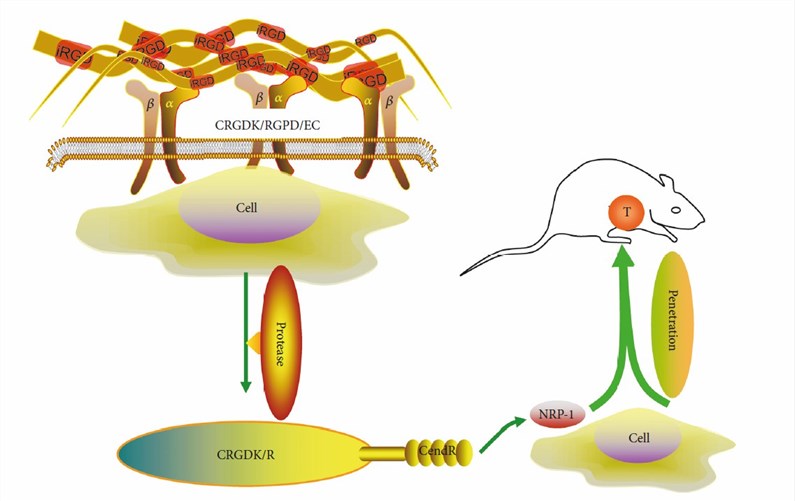Breast Cancer-Targeted Exosome Modification Service
Services BC-Targeting peptides FAQs
Breast cancer (BC) is one of the most common malignant tumors in women. In recent years, the incidence of BC has been increasing year by year and has become the malignant tumor with the highest incidence rate in the world. At present, the main treatment methods for BC are surgery and chemotherapy, but the long-term efficacy is not ideal. Therefore, exploring more new treatment strategies is still an urgent clinical need. Exosomes are lipid bilayer vesicles produced by most cells, which have good biocompatibility, in vivo circulation ability, and material delivery ability, and are easy to genetically modified. Recently, exosomes have attracted increasing attention as drug delivery systems. Directional modification of the surface of exosomes is an effective way to enhance the targeting of exosomes, so it is widely used in the research of BC-targeted therapeutic drugs. Creative Biolabs can provide targeted exosome modification technology and in vivo and in vitro functional verification services to construct and verify BC-targeted engineered exosomes for customers, helping drugs to be delivered to tumor sites precisely by exosomes.
Targeted Therapy of Breast Cancer through Engineering Modification of Exosomes
Exosomes can not only be used as carriers to load drugs but also can be modified to construct targeted exosomes to enhance their affinity to target cells and reduce their affinity to normal tissue cells, thereby enhancing efficacy and reducing adverse reactions. There are two main methods for displaying targeting peptides on the surface of exosome membranes.
-
Fusion expression of BC-targeting peptides with exosomal membrane proteins (such as lysosomal-associated membrane protein 2) by transforming donor cells.
-
Construction of BC-targeting peptides linked to lipid molecules. Co-incubation to insert lipid groups into the exosomal phospholipid bilayer.
A large number of literatures have proved that exosomes modified with BC cell-targeting peptides can efficiently target BC cells in vitro and in vivo, and can be used to deliver drugs that can inhibit the proliferation of BC cells, such as doxorubicin, siRNA, etc., thereby inhibiting tumors grow. Therefore, engineered exosomes targeting BC have great potential value for clinical application.
 Fig.1 The key steps in the tumor-targeting process of the iRGD peptide.1,2
Fig.1 The key steps in the tumor-targeting process of the iRGD peptide.1,2
BC-Targeting peptides
Creative Biolabs can provide including but not limited to the following BC-targeting peptides that have been verified by literature and can be constructed on exosomes.
|
Peptides targeting BC
|
Target
|
Targeting mechanism
|
|
iRGD peptide
|
αV integrins on tumor cells
|
iRGD peptide first binds to αV integrins on tumor cells. Subsequently, iRGD peptid is enzymatically hydrolyzed to produce CRGDK/R, which can interact with neuropilin-1, thereby promoting the internalization of exosomes and the penetration of drugs.
|
|
GE11 peptide
|
Epidermal growth factor receptor (EGFR)
|
EGFR is overexpressed in BC. GE11 peptide can act on tumor tissues with high expression of EGFR, and interact with signal transduction molecules related to tumor growth and metastasis.
|
|
AS1411 aptamer
|
Nucleolin
|
AS1411 is a G-quadruplex aptamer that can target nucleolin and inhibit tumor cell proliferation.
|
Creative Biolabs can genetically engineer exosomes together with tumor-targeting proteins, peptides or antibodies for more precise drug delivery. Please feel free to contact us to help you develop a systematic solution.
References
-
Zuo, H. iRGD: A Promising Peptide for Cancer Imaging and a Potential Therapeutic Agent for Various Cancers. Journal of Oncology. 2019:9367845.
-
under Open Access license CC BY 4.0, without modification.
FAQs
How are exosomes modified to target breast cancer cells?
Exosomes can be modified for breast cancer targeting through various approaches, including surface engineering with breast cancer-specific targeting ligands or antibodies, loading with therapeutic cargo for breast cancer treatment, or using breast cancer cell-derived exosomes for drug delivery. These modifications enhance breast cancer-specific delivery and therapeutic efficacy.
What types of breast cancer can be targeted using this service?
Breast cancer-targeted exosome modification can be applied to various subtypes of breast cancer, including hormone receptor-positive, HER2-positive, and triple-negative breast cancers. By tailoring exosomes to breast cancer-specific markers or microenvironments, targeted therapies can be developed for different breast cancer subtypes.
How are the specificity and efficacy of breast cancer-targeted exosome modifications validated?
Specificity and efficacy of breast cancer-targeted exosome modifications are validated through in vitro and in vivo studies. These include cellular uptake assays using breast cancer cell lines, biodistribution studies in animal models, therapeutic efficacy assessments, and safety evaluations in breast cancer models.
Can breast cancer-targeted exosome modification services be customized for different therapeutic approaches?
Yes, our services offer customization options to tailor breast cancer-targeted exosome modifications for various therapeutic approaches, including chemotherapy, targeted therapy, immunotherapy, and RNA-based therapeutics. We collaborate with clients to design and optimize strategies based on specific breast cancer targets.
How can breast cancer-targeted exosome modification services advance drug development for breast cancer treatment?
By enabling precise targeting of therapeutic cargo to breast cancer cells or tissues, breast cancer-targeted exosome modification services enhance the efficacy, safety, and specificity of drug candidates for breast cancer treatment. This approach holds promise for developing targeted therapies with improved clinical outcomes and reduced side effects in breast cancer patients.
For Research Use Only. Cannot be used by patients.
Related Services:

 Fig.1 The key steps in the tumor-targeting process of the iRGD peptide.1,2
Fig.1 The key steps in the tumor-targeting process of the iRGD peptide.1,2









